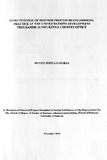| dc.description.abstract | Business Process Reengineering (BPR) is the fundamental rethinking and radical redesign of business processes to achieve dramatic improvements in critical, contemporary measures of performance, such as cost, quality, service, and speed. A process is a structured, measured set of activities designed to produce a specified output for a particular customer or market. reengineering focuses on the organization's business processes-the steps and procedures that govern how resources are used to create products and services that meet the needs of particular customers or markets.
As a structured ordering of work steps across time and place, a business process can be decomposed into specific activities, measured, modeled, and improved. It can also be completely redesigned or eliminated altogether. Reengineering identifies, analyzes, and redesigns an organization's core business processes with the aim of achieving dramatic improvements in critical performance measures, such as cost, quality, service, and speed. The elements of an effective reengineering effort are customer relations, information sharing, management participation, use of IT. prior preparation, empowerment of employees to make decisions, efficiency in the office and the actual implementation of the reengineering.
The objective of this study was to establish how effective the process had been. The study used the case study design, as it was not intended to develop or defend any particular hypothesis. In this case, Descriptive research method was used which involves describing systematically the facts and characteristics of an area of interest, factually and accurately.
The researcher used primary sources to collect the data which consisted of a interview guide comprising of open ended questions. The data was analyzed using content analysis so as to get the inference of the respondents from the interview guide used. The research had a population of six departmental heads namely the Operations, Human Resources, Procurement, Finance, IT and Programmes. All very instrumental in the reengineering process at the UNDP office being mid level managers.
All the six were interviewed and the findings herein indicate that the reengineering process at the office was a success. Key improvements were perceived to be in the areas of process improvement and little improvement was noted in the area of alignment towards the customer care and cost reduction. It can be inferred that business process reengineering implementation was focused on process improvement in the area of process management.
These improvements may be achieved by resulting to other means of process improvement such as Total Quality Management. The efficiency in the office greatly improved due to the introduction of process based rather than function based processes thus managing to eliminate delays caused by processes and non value adding processes.
From the findings in the study, organizations should not be hesitant to implement radical changes as BPR can actually lead to improved cost management and customer care thus leading to production efficiency. In order to undertake BPR and ensure success there should be a business case and top management support. Good leadership is key to success and must be exhibited throughout the reengineering process.
Organizations should seek to change the entire organization as opposed to making changes in departments. In all the reengineering process at the UNDP was a success. The actual implementation was a success though the respondents felt that they needed more training so as to enhance the reengineering efforts. Overall it was felt that the project had achieved its objectives. The challenges encountered as in all organizations were such as resistance to change, while the researcher would encourage further research on a qualitative study that would give an edge on the organization being able to compare it with such other organizations undertaking business process reengineering. | en_US |

